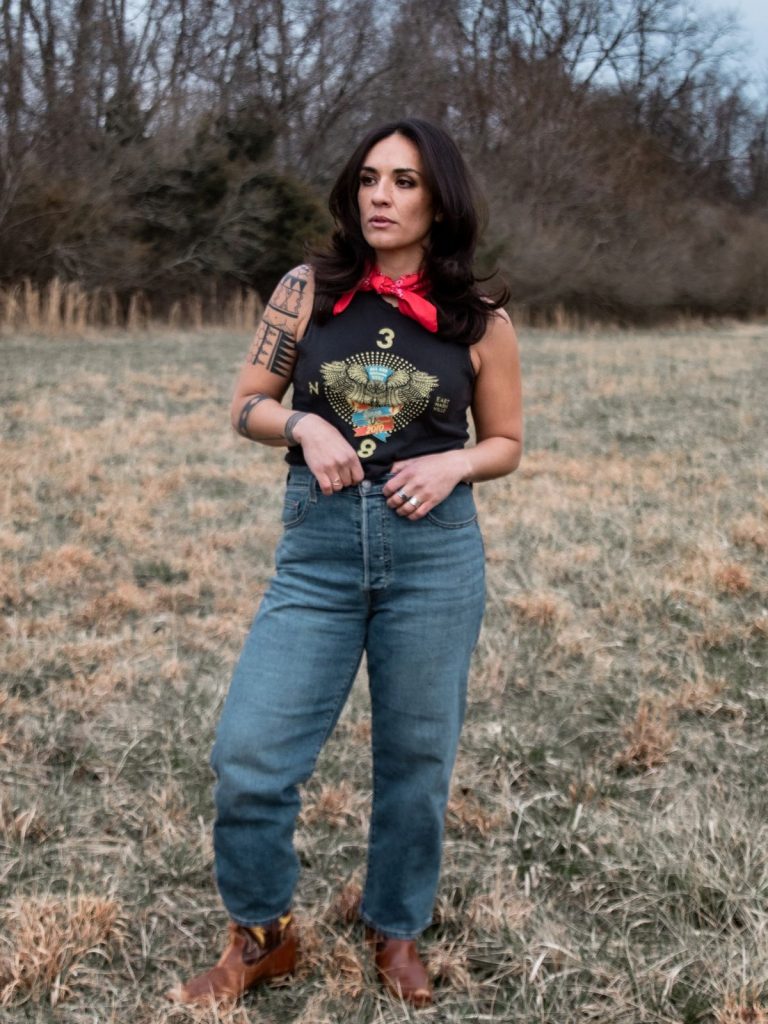Mercy Bell Follows The Wicked and The Wild on ‘Golden Child’
by Allison Kinney, Staff Writer

Golden Child, heralded as “a stone-cold ‘90s country album,” is Mercy Bell’s third studio record. Across its expanses, Bell combines her vocal skill with wholehearted commitment to character – on this heartland-themed mythology of people and places, she’s as much an actor as a singer. Her voice is like a train that cuts through this landscape: it takes you on a journey, introduces you to mysterious strangers, wails with beautiful melancholy in the night. The result is a short story collection in the form of seven songs.
The cinematic title track “Golden Child,” a collaborative effort with Sumiko Sprinkle and Cameron Newby, sets the scene for the rest of the album. Small towns, here, are self-contained worlds whose gravity makes them difficult to leave, and the lonely uncertainty of the roads beyond city limits. Like Bruce Springsteen’s quiet odes on Nebraska, the characters Bell explores in “Golden Child” can be imagined as neighbors to those in the songs that follow; they introduce the album’s interest in what people keep hidden, and in what happens when “the wicked and the wild” is revealed.

“Golden Child,” like later track “The Hustle,” depicts humor not just as a coping mechanism for sorrow, but as sorrow’s loud and ever-present housemate. “Prom king wants to be a drag queen,” Bell sings, drawing humor and sadness from the irony of how close the kid at the center is to having exactly what he wants. It’s a loss for him, but the joke’s on the football team, and everyone else the prom king has to hide his “black dress” from: they recognize his fabulousness, even when he’s concealing it under a straight facade. They wouldn’t accept his true self, but even they can see he’s royalty in exile.
Bell follows the thread of hiddenness and revelation on “Big Sky, Wide Open.” Here, her leading lady is leading a double life. Her public face is unsatisfactory because of “the same old bullshit going round and round,” while her hidden one is unsatisfactory because of its secrets: “what we’re doin’, it ain’t right.” But instead of despairing, she steps out onto the shaky bridge of imagination and asks her partner, “could we maybe see what we could write?” They attempt to reverse-engineer love from the set and props of a love song — “like: big sky, wide open, got a cherry coke and a ‘hey, good lookin’’.” It’s a storyteller’s fantasy, the belief that if you describe a better life convincingly enough it will become real. The abrupt and bleakly beautiful electric guitar provides a cynical contrast to the yearning, perhaps serving as the voice of the dead-end, three-stoplight town.
J. R. Bohannon’s production often gives the illusion that Bell and the band are in the room with you – especially impressive, considering they recorded Golden Child remotely. The intimate effect is strongest on songs where the lyrics address someone within spitting distance (“Who Said We Were Friends”), or close enough to kiss (“One Life Stand”). The emotional tone, however, swings wildly in the middle of the album. “Who Said We Were Friends,” for instance, is full of light-hearted slapstick. “Codeine” plunges back into the deep end, and could be read as a sequel to “Big Sky, Wide Open,” a farewell to the “someone at home drinking round after round after round.” The album is held together across these shifts in tone by Bell’s voice, and by her humor.
Bell ends with a direct nod to The Boss via a cover of “Atlantic City,” bringing her own rhythm to Bruce Springsteen’s eccentrically-metered lines. Springsteen’s vocals on the original are classically rough and uncertain, but Bell’s polished voice carries a great deal of justified confidence — and she does not rein it in to imitate him. This makes her version of the story slightly different. Where Springsteen’s character sounds shaken by the uncertainty of the future, Bell’s seems to have found some peace, or at least resolve, in the realization that everything might already be lost — the only remaining option seems to be to try to save it anyway.
Golden Child is out now.
Allison Kinney studies literature at the University of Virginia.